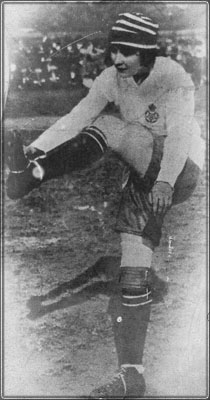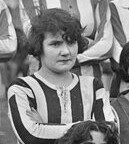
Women's association football, more commonly known as women's football or women's soccer, is the team sport of association football played by women. It is played at the professional level in multiple countries, and 187 national teams participate internationally. The same rules, known as the Laws of the Game, are used for both women's and men's football.
Dick, Kerr Ladies F.C. was one of the earliest known women's association football teams in England. The team remained in existence for over 48 years, from 1917 to 1965, playing 833 games, winning 759, drawing 46, and losing 28. During its early years, matches played for charity attracted anywhere from 4,000 to over 50,000 spectators per game. In 1920, Dick, Kerr Ladies defeated a French side 2–0 in front of 25,000 people, a match that went down in history as the first international women's association football game. The team faced strong opposition by The Football Association (FA), who banned the women from using fields and stadiums controlled by FA-affiliated clubs for 50 years.

Women's football has been played in England for over a century, sharing a common history with the men's game in the country in which the Laws of the Game were codified.

Lilian Parr was an English professional women's association football player who played as a winger. She is best known for playing for the Dick, Kerr's Ladies team, which was founded in 1917 and based in Preston, Lancashire.

Alice Joséphine Marie Milliat née Million was a pioneer of women's sport. Her lobbying on behalf of female athletes led to the accelerated inclusion of more women's events in the Olympic Games.
Joan Whalley was a female footballer who played for Dick, Kerr's Ladies F.C., making her debut for them aged just 15 in May 1937.

Stoke City Football Club Women are an English women's association football club affiliated with Stoke City. They are currently members of the FA Women's National League North.

Women's association football in Scotland has an organised history including the first international women's match in 1881, the president of the British Ladies' Football Club in 1895, Lady Florence Dixie, the Edinburgh–Preston "World Championship" in 1937 and 1939, and the Scottish Women's Cup founded in 1970. The sport is jointly overseen by Scottish Women's Football, the Scottish Football Association, and Scottish Professional Football League.

Women's football in France is run by the French Football Federation. As such the national team are eligible to play in the World Cup and the European Championship, whilst clubs can enter the UEFA Women's Champions League. The earliest known women's football match involving the French was a women's French team versus the Dick, Kerr's Ladies team from Preston, played at Goodison Park, Liverpool on Boxing Day 1920, attracted a crowd of 53,000 with another 10–15,000 reportedly turned away because the ground was full.
The British Ladies' Football Club was a women's association football team formed in Great Britain in 1895. The team, one of the first women's football clubs, had as its patron Lady Florence Dixie, an aristocrat from Dumfries, and its first captain was Nettie Honeyball.
Valerie Robinson OBE was an England and Great Britain field hockey international, who played 149 international games and represented her country for more than 20 years.

Helen Matthews, real name probably Helen Matthew, also known by her pseudonym Mrs Graham, was a Scottish footballer, artist, and suffragette. Matthew is known as a leading player and team captain from the 1890s, and for recruiting the first black woman footballer, Emma Clarke.
The English Ladies' Football Association (ELFA) was formed in 1921 and active until 1922. It was arguably a direct response to the Football Association (FA)’s ban on women's football teams. The first meeting of the ELFA was held several weeks after the ban and Leonard Bridgett, the manager and coach of Stoke Ladies, was its first president. Bridgett helped to organise the first and only English Ladies Football Association Challenge Cup competition in the spring of 1922. 24 teams entered the competition and the winners were Stoke Ladies, who beat Doncaster and Bentley Ladies 3–1 on 24 June 1922.

Alice Cook was an association football player and the first captain of Dick, Kerr Ladies F.C., one of the first prominent female football teams in the world. She played in their inaugural match at Preston North End's Deepdale on Christmas Day 1917.

Alice Stanley was an English footballer. She played for Dick, Kerr Ladies, one of the earliest women's association football teams. She was a sprinter and one of the first women to race under Amateur Athletic Association of England (AAA) laws.

The Fédération des sociétés féminines sportives de France was a French organisation set up to promote women's sport. The FSFSF was responsible for the French women's football championship from 1919 until 1932, and organised the Women's Olympiad, an alternative to the Olympic Games, between 1921 and 1923.

On 27 December 1920, Dick, Kerr Ladies beat St Helens Ladies 4–0 at Goodison Park in front of 53,000 spectators, an attendance figure for a women's club football match that would not be exceeded for 99 years, and for a women's club football match in the United Kingdom that would not be exceeded for 103 years.

Carmen Charlotte Marianne Pomiès was a French javelin thrower and international association football player in the 1910s to 1930s, and a member of the French Resistance during World War II.
Mary Alice Walker was an English women's association football player and the earliest known women's player to be transferred between clubs for a fee. She was one of four players who moved from Lancaster Ladies to Dick, Kerr Ladies F.C. after a match between the clubs in December 1917, and the only of the four offered compensation specific to her transfer. She debuted for Dick, Kerr Ladies against Barrow-in-Furness at Deepdale on Good Friday of 1918, in which Walker scored the match-winning goal.












